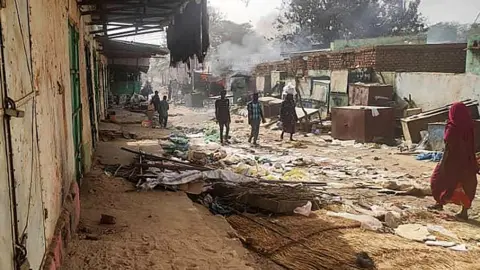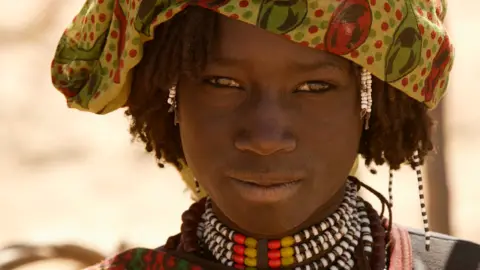Sudan's Darfur conflict: Why an accountant took up arms
 AFP
AFPAccountant Mohamed Osman has been forced to pick up an AK-47 rifle for the first time in his life to defend his neighbourhood as the conflict in Sudan escalates, inflaming racial tensions between Arabs and other groups in the country's volatile Darfur region.
Mr Osman lives in El Geneina, historically a symbol of black African power in Darfur, that has been shelled, burnt and looted by the paramilitary Rapid Support Forces (RSF) and allied Arab militiamen. Their notoriety has earned them the nickname Janjaweed, an Arabic word for "devils on horseback" .
"I've never seen such a thing in more than 20 years of war in Darfur. It's awful," Mr Osman, 38, said. We have changed his name for his own safety.
"Whenever there is an attack by the Janjaweed here in El Geneina, their fellow tribesmen come with their arms from across the border in Chad on motorbikes and on horsebacks to assist them," he told the BBC from his home in the northern Ardamata neighbourhood.
Mr Osman's office, in the city centre, is a burnt-out wreck.
"I can't go there, let alone work," he noted, in a matter of fact way.
Another resident, Mohammed Ibrahim, said the city had been taken over by the RSF and Janjaweed, with snipers positioned in buildings and gunmen on streets.
"They're just shooting every place. If you go outside you'll be killed. You can't move, even 200 or 300 metres," Mr Ibrahim told the BBC. His name has also been changed.
Medics reported that at least 280 people have been killed and 160 have been wounded in El Geneina in the last few days alone.
The latest violence is seen by analysts as a clear breach of the 11 May Saudi-brokered agreement between the RSF and the Sudanese army to alleviate the suffering of civilians, while talks aimed at reaching a ceasefire continue in Jeddah.
Mr Osman said that as the fighting advanced closer to Ardamata in recent days, he and many other men in his neighbourhood got AK-47 rifles and began carrying out 24-hour patrols in shifts.
This was something he never imagined doing, as his life used to revolve around keeping track of the finances of his clients.
"We have no choice but to arm ourselves and defend our city," Mr Osman said, pointing out that he could not risk exposing his family - including his mother, sisters, nieces and nephews - to the much-feared paramilitaries and militiamen.
Asked how he acquired his Soviet-made Kalashnikov rifle, he replied wryly: "The cheapest thing you can buy here is a weapon."
In contrast, food has become scarce and prices have rocketed as the RSF and Janjaweed set markets ablaze.
"They even burnt the food and flour that was stored in the markets, as if they want the survivors of bullets to die of hunger," said Ishaq Hussein, a former worker at a non-governmental organization in El Geneina.
The BBC has been unsuccessful in attempts to reach the RSF for comment.
 Getty Images
Getty ImagesWith a population that was put at around 170,000 in the last census in 2010, El Geneina is the traditional capital of the Massalit kingdom, making it a target for the Janjaweed. They have long been accused of ethnic cleansing against non-Arab groups in Darfur.
"The Janjaweed are killing all the African people starting with the Massalit," Mr Ibrahim said.
Conflict first erupted in Darfur in 2003 when mostly non-Arabs took up arms against the government, complaining about discrimination and a lack of development.
The government retaliated by mobilising the Janjaweed, and later welding them into an estimated 80,000 to 100,000-strong paramilitary force that has now turned on Sudan's military ruler Gen Abdel Fattah al-Burhan, and the army he commands.
The RSF launched an assault on the capital Khartoum on 15 April, with the military retaliating with daily air strikes in a bid to regain control of the city.
But in El Geneina, there is no attempt to fight back against the RSF and the Janjaweed.
"There's a zero presence of the army or any other government body to protect the civilians," Mr Ali said.
The Norwegian Refugee Council (NRC) estimates that about 100,000 people have fled their homes in the city, and remain "at the mercy of the relentless violence, with settlements once again being reduced to ashes".
"We are still unable to deliver emergency aid," NRC added in a statement.
Mr Ibrahim said that water supplies had also been cut.
"Water is a big problem for everyone, even for the donkey," he said.
He made a desperate plea for international help, saying the city has been under attack for 23 consecutive days.
"A lot of injured people don't have any type of treatment, more than hundreds and hundreds and hundreds," Mr Ibrahim said.
He added that he was alone at home, having sent his wife and family to safety.
"I have kids and it's difficult for them to be hearing these guns every day. That's why I sent them out," he said, pointing out that families tend to leave in guided groups before sunrise, when the risk of being confronted by the RSF and Janjaweed is less.
Mr Osman said that if the security crisis deepens, he too will flee to Chad to live in make-shift camps.
"If this does not stop by the mercy of Allah, I will take my family and run to Chad to stay in a shelter built with our clothes rather than being killed here," he said.
